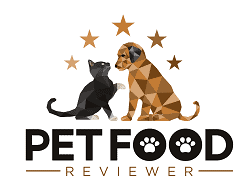What is Sunflower Oil?
Sunflower Oil is the fatty acids that are derived from Sunflower Seeds which grow in the center of the flowers of the Sunflower plant.
Sunflower Oil is used as a cooking oil and is included in many processed foods for human consumption.
Sunflower Oil has recently been included to supplement dog food as it is favored compared to other oils like Canola Oil and cheaper than premium oils like Olive Oil.
Sunflower Oil’s inclusion is likely to improve the taste and palatability of dog food, as fats and oils are very appealing to dogs.
Sunflowers are very recognizable, and there is often competition to see who can grow the tallest plant in a season.
However, the sunflowers that produce Sunflower Oil are grown on an industrial scale in countries such as Russia and Ukraine.
Sunflower Oil Nutrition
Sunflower Oil’s primary nutritional value is fat. The majority of the fat present in Sunflower Oil is unsaturated fat which some consider being more favorable. Fat is essential to dogs for a number of reasons.
First of all, it is critical to a number of bodily functions. Fat is vital for the maintenance of the body’s cells, tissues, and nerves. Fat is also essential to aid the absorption of certain Vitamins and regulate hormone levels.
The second use of fat in dogs is as a concentrated source of energy. Fat is more than twice as calorie dense as carbohydrates or protein, which makes it perfect for this purpose.
Dog’s who are more active can benefit from increased levels of fat in their diet. However, inactive dogs need to be careful of their fat consumption to avoid weight gain or obesity.
Sunflower Oil is high in the Omega 6 Fatty Acids. While not quite as beneficial as the Omega 3 Fatty Acids, they can still provide a range of health benefits and are a positive addition to dog food.
Some examples of the benefits of the Omega 6 Fatty Acids include the prevention of heart disease and reduced inflammation. Also, similarly to the Omega 3 Fatty Acids, they can improve the condition of a dog’s skin and coat.
Because Sunflower Oil is created from Sunflower Seeds, it contains many of the vitamins and minerals that they do.
This includes Vitamin A, C, D, and E. While a dog is likely to gain some of these from other ingredients in its diet, this supplementary amount could provide further benefit.
Risks of Sunflower Oil
The risks of Sunflower Oils for dogs are relatively minimal. If fed in modest quantities, such as an addition to homemade food or as an ingredient in commercial dog food, it is unlikely to have any adverse effects, such as weight gain.
Some experts would say that the Omega 6 Fatty Acids provided by Sunflower Oil isn’t as beneficial as one would think.
This is as the ratio of Omega 3 Fatty Acids to Omega 6 Acids needs to be appropriately balanced for dogs to gain their full benefit. When Sunflower Oil is used as a supplementary ingredient, this balance can be disrupted.
Dog Food Brands That Use Sunflower Oil
While far from the most popular ingredient in dog food, many pet food brands use Sunflower Oil in their products.
Some well-known examples include Purina Pro Plan, Taste of the Wild, Zignature, Rachael Ray Nutrish, Merrick, Earthborn Holistic, and American Journey. However, there are far more brands that use Sunflower Oil at varying levels.
Some of these brands go as far as to advertise and discuss their use of Sunflower Oil. This includes presenting it as natural and discussing the Omega Fatty Acids and Vitamins it can provide.
This shows that these brands do not perceive Sunflower Oil to be a negative or adverse ingredient.
However, it appears that Sunflower Oil’s use in dog food may be declining, as our recent analysis of the 100 most popular dry dog food recipes on Chewy.com found that only four contained Sunflower Oil.
You can see an example of the use of Sunflower Oil in a dry dog food recipe in the below ingredient list of Purina Pro Plan’s Adult Sensitive Skin & Stomach Salmon & Rice recipe.
As you can see, Sunflower Oil is a minor ingredient in this recipe and is present in similar quantities to ingredients like Natural Flavor and Chicory Root.
In this recipe, it is likely used as a minor binding agent to help hold the ingredients of the food together in a consistent texture and appearance.




